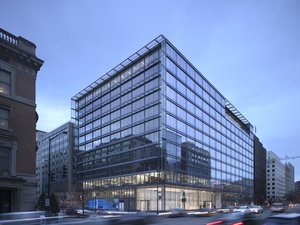
D.C.’s startup ecosystem stands at a crossroads.
When George Floyd, a Black man, was killed by a white police officer in Minneapolis a month ago, the impact proliferated far and wide, stimulating protests and responses across geographies, industries, arenas and walks of life.
Greater Washington’s innovation economy both made and heard the overdue call for equity, to tackle social injustice. It was a moment for groups working to diminish disparities — and create a more inclusive startup ecosystem — to step in and step up.
Efforts to support founders of color and female entrepreneurs exist, some younger than others and all with their eyes on a stronger, more diverse startup community. Some launched for that very purpose, and others increasingly made it a priority. All have backed women-led and minority-led local ventures through funding, incubation, networking and training.
But has it been enough?
I spoke with a few of them, about the entrepreneurs they’ve helped, the initiatives that have worked — and, the work that still needs to be done.
Vinetta Project
The D.C. chapter of national nonprofit Vinetta Project has been growing since 2016, supporting female founders to close the gender funding gap with programming, events and a major pitch competition every year.
In that time, it’s seen a 23% increase in applicants to its contest, with about half of companies that have come through its programming now generating revenue — and $33 million raised. The local organization has built a pipeline of more than 100 investors and 267 founders.
But the work doesn’t stop there, said Dawn Myers, who took over as director this year.
“So much of the space is about the social capital, so much of the space is about being connected, so much of the space is about social access, and that access is almost as difficult to come by as the funding itself,” Myers said.
So she and her team source deal flow and connect founders in front of the VCs interested in their type of work. And now, they’re reviewing their metrics to make sure they’re on the right track. One way they’ve stepped up that work? Vinetta just struck a partnership with Bowie State University, a historically black university in Prince George’s County, to help plug Black women founders into its community. It’s a model for what could become more, said Myers, also a founder in her own right, in running hair tool startup The Most.
“I firmly believe that the only way we get to this promised land that we’re all shooting for is if we do the work now,” she said.
Halcyon
For D.C.’s Halcyon, supporting women and diverse founders wasn’t intrinsic to its original mission, which aimed to find social impact companies and support them to scale, said CEO Kate Goodall.
But in its first year in 2014, when about a quarter of Halcyon’s incubator companies had a female leader or founder of color, the nonprofit saw “very quickly” the inequity so unevenly distributed for those entrepreneurs.
“We started to open the aperture and really question — ‘What were our networks? Where was the message getting?’ — just to increase the pipeline, because I know for sure there’s a pipeline,” Goodall said. “I hate the pipeline problem excuse… it’s laziness. When people say there’s no pipeline? No. It’s because it’s not in your network, because you haven’t done a good enough job and hard enough work in opening your network up. So we were very intentional about that.”
“That’s how we ended up becoming an incubator that has diversity reflected,” she added, “and then that builds on itself, because everybody sees it as their incubator.”
Since then, Halcyon has built an identity as a global organization, drawing early-stage startups that perhaps haven’t yet hit the barriers inherent to the investment community. Its programming prepares its fellows to pitch to anyone, “because the world is the world, and you’ve got to be able to talk to an investor who doesn’t look like you, and do it well,” Goodall said. Its executives and advisors also work with investors “to get them to see the opportunities that they’re missing,” she said. “A lot of it, I believe, is very unconscious, but we have to stop being lazy about where we’re unconscious, that’s not an excuse anymore.”
So the organization is starting a new angel investment network, to expand and diversify the local investment ecosystem. It’s also building up a fund to invest in its own companies for the first time. The alumni that have gone through its incubator have raised more than $100 million in investments and created more than 1,000 jobs. And now, 51% of its ventures have a female founder and 63% have a founder of color.
“That has really made this now inherent to our mission,” Goodall said, “because in order for everyone to succeed and scale, we really have to do even more to address all of these inequities that we know are out there.”
Walker's Legacy
Walker’s Legacy has been fostering growth for businesswomen of color for more than a decade.
This year, that work has expanded into new markets, embedding local leaders to spearhead the organization’s work in communities across the U.S. It put together an emergency grant to nearly 60 displaced university students, as student housing displacements spiked amid the pandemic. It’s now developing a research study to understand the impact of Covid-19 on minority women entrepreneurs, set to launch this summer.
And it has seen increasing interest from women interested in starting or running their own companies during coronavirus.
Now, Walker’s Legacy is cooking up some new efforts, said founder and CEO Natalie Cofield, declining to disclose details at this time.
“This work is never done,” she said, “until women of color businesses reach parity on all fronts.”
Citrine Angels
A year ago, former Wall Street banker Allyson Redpath started building Citrine Angels, a D.C. angel investing group focused on bringing more female investors into the fold and boosting support for women.
It filled a major void in our market, because there was nothing focused on funding female founders, said M3 Advisors founder Stephanie Marshall, who took over as Citrine board president when Redpath was tapped for a gig with the Maryland Department of Commerce.
Citrine went live in September, holding social events and pitch meetings over the subsequent four months, with a few companies presenting at each. Citrine now has 15 board members and around 50 angel members who have collectively invested more than $200,000 in a handful of companies, Marshall said.
“Absolutely we want to invest in female founders, but the other part of the mission is to really educate women and let them know about this investment class, in terms of diversifying their portfolio,” she said.
“Is it enough?” Marshall said. “No. Absolutely not.”
So as Citrine heads into its next year, it’s doubling down to ensure that women starting companies are supported with different types of financial support, making introductions and building relationships with other angels in the local ecosystem, she said. “I think we have a strong foundation, we just have to add some rocket fuel to it.”




